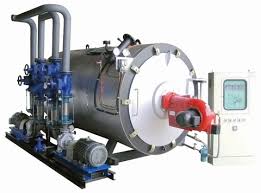
नोभ . 21, 2024 17:43 Back to list
thermal oil boiler working principle
Working Principle of Thermal Oil Boilers
Thermal oil boilers, also known as thermal fluid heaters, have gained popularity in various industries due to their efficient heat transfer capabilities and versatility. Unlike traditional steam boilers that use water as a heat transfer medium, thermal oil boilers employ organic thermal fluids that can operate at higher temperatures without the risks associated with steam under pressure. This article provides an overview of the working principle of thermal oil boilers and their applications.
Basic Components
A thermal oil boiler consists of several key components that facilitate its operation. These include the furnace, heat exchanger, thermal oil pump, expansion tank, and control system. The furnace is where combustion takes place, generating heat that is transferred to the thermal oil circulating in the system. The heat exchanger allows the thermal oil to transfer heat to the process or equipment requiring thermal energy. The thermal oil pump ensures the continuous circulation of the oil throughout the system, while the expansion tank accommodates changes in the volume of the thermal oil as temperatures fluctuate. Lastly, the control system regulates the boiler's operations, ensuring safety and efficiency.
Operating Principle
The operation of a thermal oil boiler begins with the combustion of fuel, which can range from natural gas and fuel oil to biomass. The fuel is combusted in the furnace, producing hot flue gases that rise through the unit. The design of the boiler allows these gases to pass through a series of channels or tubes, transferring their heat to the thermal oil that circulates around them.
Thermal oil, typically composed of synthetic or organic compounds, has a significantly higher boiling point than water. This property allows it to absorb and carry thermal energy to high temperatures, often reaching up to 400°C (752°F) or even higher in certain systems. As the thermal oil heats up, it flows through a network of pipes and valves to the heat exchanger, where it transfers its heat to the process equipment or spaces that require heating.
Once the oil has delivered its thermal energy, it returns to the boiler to be reheated. This closed-loop system minimizes heat loss and promotes energy efficiency. Integral to this cycle is the thermal oil pump, which maintains circulation and ensures a steady supply of heated thermal fluid to the application.
thermal oil boiler working principle

Advantages
Thermal oil boilers offer several advantages over traditional steam boilers. One of the primary benefits is the ability to operate at high temperatures without the corresponding high pressures associated with steam systems. This results in safer operation and reduced risk of thermal shock and boiler explosions. Additionally, thermal oil systems have fast response times, allowing them to quickly meet fluctuating heat demands.
Another notable advantage is the energy efficiency of thermal oil boilers. The heat transfer properties of thermal oils results in minimal temperature drops as the fluid circulates through the system, ensuring that the heat generated is effectively utilized. Furthermore, thermal oil boilers have a compact design, making them suitable for installations with limited space.
Applications
The versatility of thermal oil boilers makes them suitable for a wide range of applications. Industries such as chemical processing, food production, textiles, and manufacturing frequently utilize thermal oil heating systems. They are ideal for processes requiring constant and reliable heat, such as drying, distillation, and melting. Additionally, thermal oil boilers can be integrated into renewable energy applications, assisting in the efficient capture and use of solar energy.
Conclusion
Thermal oil boilers represent a modern solution for a variety of thermal energy needs. Their unique working principle, which involves the use of high-temperature, low-pressure thermal fluids, provides enhanced safety and efficiency compared to traditional steam systems. With their adaptability across numerous industries and applications, thermal oil boilers continue to play a pivotal role in advancing efficient thermal energy management. Whether in process industries or renewable applications, thermal oil boilers demonstrate their significance in today's energy landscape.
-
High-Efficiency Commercial Oil Fired Steam Boiler for Industry
NewsJul.30,2025
-
High-Efficiency Biomass Fired Thermal Oil Boiler Solutions
NewsJul.30,2025
-
High Efficiency Gas Fired Thermal Oil Boiler for Industrial Heating
NewsJul.29,2025
-
High-Efficiency Gas Fired Hot Water Boiler for Sale – Reliable & Affordable
NewsJul.29,2025
-
High Efficiency Biomass Fired Hot Water Boiler for Industrial and Commercial Use
NewsJul.29,2025
-
High-Efficiency Biomass Fired Hot Water Boiler for Industrial Use
NewsJul.28,2025
Related PRODUCTS






















